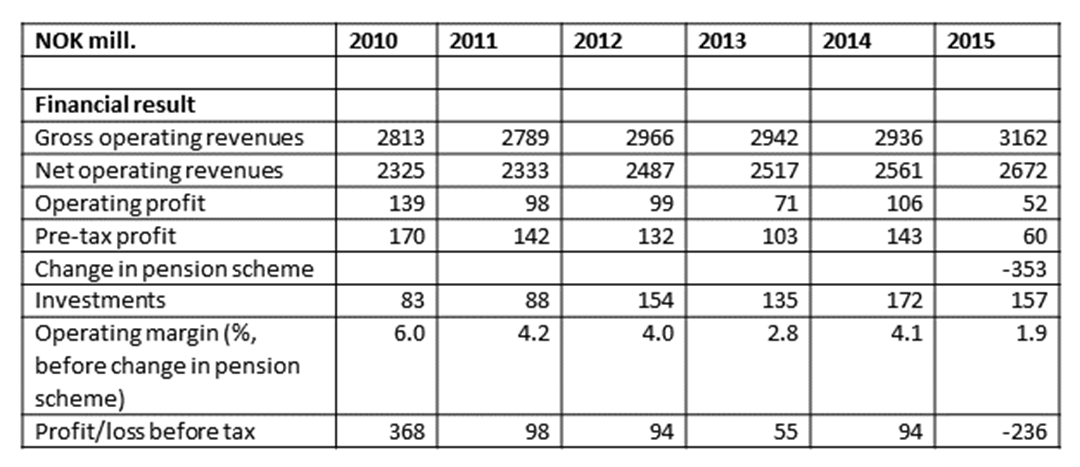SINTEF has a strong balance sheet and good financial solidity and liquidity, but its profits during 2015 have been weak.
The decline in the oil price and low energy prices have impacted many of SINTEF's customers. This has resulted in the cancellation or postponement of some research projects. Market conditions have been particularly challenging in the oil and gas, energy and maritime sectors.
"One-off effects have had a significant impact on our financial result, but our operating revenues are weak", says Group President Alexandra Bech Gjørv. "This is an unsatisfactory situation because we need to generate profits in order to invest in laboratories and new research projects. Such investments are essential if we are to deliver the high levels of quality on which SINTEF has built its name, and at a time when our expertise is crucial to the industrial restructuring process that Norway is currently undergoing. This is why we must intensify our focus on costs, efficient operations, sales, and on maintaining close contact with our customers", she says.
Results impacted by one-off items
In 2015 SINTEF reported gross turnover figures of NOK 3,162 million, compared with NOK 2,936 million in 2014.
A total of NOK 46 million is linked to restructuring costs in connection with personnel reductions and closure of the company SINTEF do Brasil. In terms of revenues, we have seen the effect of the sale of SINTEF's interests in the spin-off companies Resman and GasSecure, amounting to NOK 93 million.
From 2016 SINTEF is introducing a new pension scheme. Discontinuation of the previous scheme has affected the 2015 financial result in the form of a deficit of NOK (-) 353 million, leaving SINTEF with an extraordinarily poor result. After financial items and the impact of the pension discontinuation, the overall deficit is NOK (-) 293 million.
After correction for one-off expenditures related to discontinuation of the previous pension scheme, SINTEF reported a pre-tax profit of NOK 60 million, compared with NOK 143 million in 2014.
Starting in 2016 the new pension scheme will result in lower pension expenditures in the long term, including a reduction of approximately NOK 80 million in 2016, compared with 2015.
SINTEF's financial status is good. Equity at the close of 2015 amounted to NOK 2,126 million, which represents 58 per cent of SINTEF's total assets.
Major restructuring
Substantial measures have been put in place to safeguard effective operations, including intensified sales efforts combined with personnel reductions and other costs savings.
SINTEF has reduced its total number of employees by 107. This figure includes 32 employees at a company which was sold by SINTEF. All personnel reductions have been achieved without resorting to dismissals.
Major investments
In 2015, SINTEF invested NOK 157 million in laboratories, scientific equipment and other fixed assets. The largest investment is linked to the SINTEF Energy Lab in Trondheim, which was opened in September.
Since 2007, SINTEF has invested approximately NOK 1.2 billion in laboratories, office facilities and equipment.
Clients
During 2015, SINTEF worked on a total of 5,445 projects for 3,792 small and large clients. Fifty per cent of its gross operating revenues were generated from projects carried out on contract directly from Norwegian businesses.
Overseas sales amounted to NOK 499 million. Sixteen per cent of SINTEF's operating revenues were generated from overseas projects, and in 2015 SINTEF had clients in 54 countries worldwide.
EU-funded research projects accounted for approximately 40 per cent of global sales, although participation in such projects is proving to be financially challenging for SINTEF. Provision has been made in the accounts pending the clarification of regulatory issues related to the coverage of expenditures linked to the EU's 7th Framework Programme for Research and Development.
Health, Safety and the Environment (HSE)
HSE has the highest priority at SINTEF. Seven incidents occurred during 2015 that resulted in sickness absence. This led to an "H1 factor" (total injuries/sickness resulting in sick leave per million hours worked) of 1.9, compared with zero in 2014. Sickness absence was at 3.9 per cent, at the same level as in 2013 and 2014. SINTEF experienced no accidents in 2015 that had a negative impact on the external environment.
Personnel
At the turn of the year SINTEF had 1,975 employees. 55 per cent of researchers have doctorate degrees, compared with 44 per cent in 2009. The proportions of women among research scientists and managerial staff are 29 and 36 per cent, respectively.
Twenty-one per cent (412) of SINTEF's employees come from as many as 71 countries outside Norway. SINTEF's foreign employees provide a valuable source of scientific and cultural expertise.
Robust scientific and technical results
SINTEF produces consistently high levels of quality in its scientific and technical results, and receives much positive feedback from our business partners and clients.
In 2015, the Research Council of Norway established 17 new centres for Research-Based Innovation (SFIs). SINTEF is involved in nine of these centres, and has been assigned the role of host for four of them. The SFI centres promote innovation by investing in long-term research carried out in close collaboration by commercial companies and the leading research centres in question.
Future prospects
The dramatic fall in oil and energy prices is having a considerable impact on the Norwegian economy and domestic businesses. SINTEF notes that clients linked to the oil and gas and supply sectors have cancelled or postponed some planned research projects. At the same time there is an increasing need for projects that can promote costs savings and efficiency, and which can assist in the extensive restructuring in Norway.
This situation presents SINTEF with both challenges and opportunities. It is essential to maintain a targeted client focus as a means of safeguarding revenues and continuing to assist our private and public sector clients during these very challenging times. The major importance of the restructuring process also introduces an increased need for research and innovation, where SINTEF has a significant role to play.
Financial key figures for SINTEF 2010-2015 (Group)



